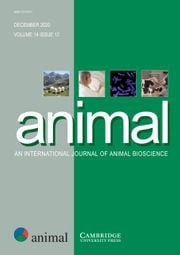Short communication: insoluble fibres in supplemental pre-weaning diets affect behaviour of suckling piglets
C. Clouard1†, L. Stokvis1, J. E. Bolhuis1 and H. M. J. van Hees2
1 Adaptation Physiology Group, Department of Animal Sciences, Wageningen University & Research, PO Box 338, 6700 AH Wageningen, The Netherlands;
2 Trouw Nutrition R&D, PO Box 220, 5830 AE Boxmeer, The Netherlands
† Author to whom correspondence should be addressed.
Animal. 2018 Feb;12(2):329-333. doi: 10.1017/S1751731117001501. Epub 2017 Jul 13.

Abstract
We investigated the effect of offering supplementary dietary fibres to suckling piglets on their behaviour and performance before weaning. From 5 to 22 days of age, suckling piglets were offered a high-fibre diet (HF; 5% cellulose; n=5 litters), or a control low-fibre diet (n=5 litters). Piglets were housed with the sows in individual farrowing pens, and had access to maternal milk until weaning, at 23 days of age. Behaviours of six focal piglets per pen were scored at 6, 16 and 21 days of age. All piglets were individually weighed at 5, 15 and 20 days of age and feed intake was measured daily at the pen level. Piglets on the HF diet were more active than controls (P=0.05), and spent more time suckling or massaging the udder (P=0.01) and interacting with pen mates (P=0.008). Time spent manipulating pen mates, which may reflect re-directed foraging activity in the absence of substrate, accounted for most of the time spent interacting with pen mates (⩾73% of total time spent interacting). Dietary fibres had no effect on BW and feed intake. In conclusion, inclusion of cellulose in the supplemental diet of suckling piglets affects behaviour, with no deleterious effects on performance before weaning.
Keywords: cellulose; dietary fibre; manipulative behaviours; mastication; pigs.